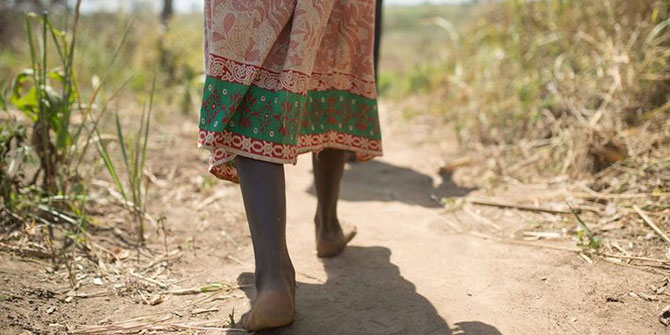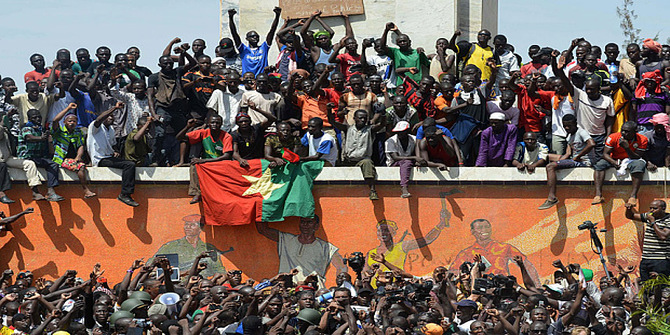After spending a year working at the Kigali Genocide Memorial Centre in Rwanda, Nottingham University’s Caroline Williamson presented the findings of her field research at LSE’s Africa Seminar Series. Looking at Rwandan women’s testimonies of the 1994 genocide, her project examines representations of positive identity change resulting from the trauma caused by the genocide, otherwise known as posttraumatic growth.
Posttraumatic growth refers to the positive changes that certain individuals experience as a result of the struggle with a traumatic event. Previous research into this phenomenon has tended to focus on changes at the individual level, with little research investigating positive changes experienced by groups or societies. The paper presented at LSE explored the concept of posttraumatic growth at the collective, societal level.

Albeit scarce, existing literature on collective posttraumatic growth has highlighted factors such as national self-esteem, intra-group cohesion and national pride, as positive changes that may occur in a community following a traumatic event. During the seminar, these factors were considered in the context of Rwanda and it was argued that such phenomena cannot be considered as positive change because, in reality, they constitute part of a much more dangerous process of inter-group differentiation; a typical group response to a situation of threat or conflict. Broadly speaking, inter-group differentiation encompasses processes of ingroup enhancement and outgroup derogation; where ingroup enhancement corresponds to increased ingroup cohesion, collective identity and perceptions of the ingroup in more favourable terms; and outgroup derogation refers to negative attitudes, discrimination, distrust and antagonism with outgroup members. Within this framework, factors such as group cohesion and national pride appear to correspond more to processes of ingroup enhancement rather than posttraumatic growth. The talk used Rwanda as a case study to examine the social consequences of such processes.
As was argued in the seminar, the Rwandan government engages in intense inter-group differentiation via policies of unity and reconciliation. While Anglophone-returning Tutsi refugees benefit from processes of ingroup enhancement, system legitimation and self-glorification, Tutsi genocide survivors and the majority Hutu suffer the damaging effects of outgroup derogation. The case of Rwanda thus demonstrates that, despite being associated with positive emotions, notions of enhanced cohesion and group identity are in fact quite detrimental, particularly when limited to one group within a given society. It appears that these processes of ingroup favouritism are unavoidably associated with processes of outgroup derogation, creating further tension and conflict. It was suggested that genuine post traumatic growth at the collective level necessarily involves much more complex and mature understandings of the past and discovering ways of interacting that result in constructive, rather than destructive, social behaviour. Borrowing concepts from transitional justice, such as truth, justice, forgiveness and reconciliation, the paper presented evidence from Rwandan women’s testimonies of the genocide to argue that processes of posttraumatic growth are indeed taking place in Rwandan society.
For example, genocide survivor RB demonstrates a remarkable commitment to the truth that contributes significantly to a more open and honest social narrative of the events of 1994. By speaking frankly about her experiences of sexual violence and denouncing those guilty of rape, she holds to account people in positions of power and gains justice, even at the risk of her own dignity and security.
“They started to look for me because I committed the crime of saying the names of leaders who were still soldiers in the Rwandan army but I continued to say their names… There is no day I will hide the truth.”
Although highly controversial, her testimony was greatly respected by other survivors because she provided hope that the history of the genocide may be explored in more pluralist terms. Another survivor, GM, also contributes to achieving posttraumatic growth at the collective level:
“Whether Hutu, Tutsi or even Twa, none of us was spared; some were perpetrators, others were victims, but all of us were in trouble… If it comes from the heart when a person says to me, ‘Forgive me, I was involved in the killing of your sibling, your parent…’ I would understand. I would forgive them because the burden they carry in their heart is enough of a punishment.”
GM demonstrates great maturity in understanding that the line between victim and perpetrator is not as clear as some would like to think. Moreover, she rehumanises those guilty of genocide by highlighting the individual nature of their crimes and provides them with the opportunity to express their genuine remorse. Her emphasis on restorative forms of justice and her willingness to forgive represent significant steps towards reconciliation.
The paper concluded that, despite numerous examples of inter-group differentiation taking place in Rwanda, there are also many cases of genuine positive change and posttraumatic growth at the collective level, providing hope for Rwanda’s future.






Interesting analysis! I would also argue that you if the any of the positive changes in Rwanda would be associated with the genocide, it would have come from a grass roots level. In reality changes in Rwanda are very top-down. I think one should investigate historical society structure and its impact on reconciliation within Rwandan society.